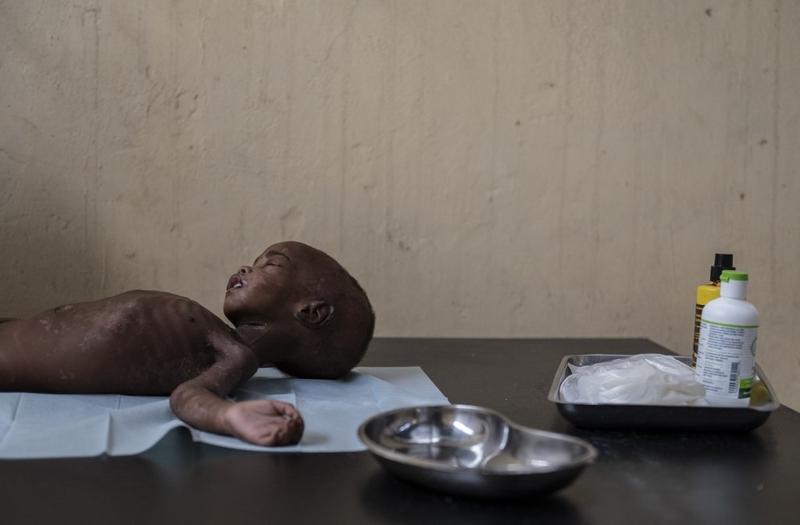 Severely malnourished Ali Althaja lies on a table before having his skin lesions washed in the emergency medical care section for critical care patients in the ALIMA (Alliance for International Medical Action) nutrition unit of the hospital Tchad/Chine in N'djamena, Chad on May 13, 2022. Ali is so malnourished that lesions have formed on his skin as cells break down. The increase in malnutrition cases is caused by multiple factors, including COVID-19, a drop in farming output, and now the conflict in Ukraine, with prices of basic staples rising rapidly. (ANDREW CABALLERO-REYNOLDS / AFP)
Severely malnourished Ali Althaja lies on a table before having his skin lesions washed in the emergency medical care section for critical care patients in the ALIMA (Alliance for International Medical Action) nutrition unit of the hospital Tchad/Chine in N'djamena, Chad on May 13, 2022. Ali is so malnourished that lesions have formed on his skin as cells break down. The increase in malnutrition cases is caused by multiple factors, including COVID-19, a drop in farming output, and now the conflict in Ukraine, with prices of basic staples rising rapidly. (ANDREW CABALLERO-REYNOLDS / AFP)
UNITED NATIONS - The global economy is predicted to expand by only 3.1 percent this year, down from the 4.0 percent projected in January, largely due to Russia's special military operation in Ukraine, according to UN's latest World Economic Situation and Prospects (WESP) report, launched on Wednesday.
As the mid-year forecast shows, the conflict has disrupted the fragile economic recovery from the pandemic, resulting in a humanitarian crisis in Europe, rising food and commodity prices, and exacerbating inflationary pressures.
The outlook for energy and food prices is particularly bleak for developing economies that import commodities, and food insecurity is on the rise, especially in Africa
With sharp increases in food and energy prices, global inflation is projected to reach 6.7 percent this year, more than double the average of 2.9 percent during the period from 2010 to 2020.
"The war in Ukraine - in all its dimensions - is setting in motion a crisis that is also devastating global energy markets, disrupting financial systems and exacerbating extreme vulnerabilities for the developing world," said UN Secretary-General Antonio Guterres.
ALSO READ: IMF to downgrade global growth forecast amid Ukraine crisis
"We need quick and decisive action to ensure a steady flow of food and energy in open markets, by lifting export restrictions, allocating surpluses and reserves to those who need them, and addressing food price increases to calm market volatility," he added.
In addition to the world's largest economies - the United States, China, and the European Union - the majority of other developed and developing economies have seen their growth prospects downgraded.
The outlook for energy and food prices is particularly bleak for developing economies that import commodities, and food insecurity is on the rise, especially in Africa.
The WESP report, published by UN's Department of Economic and Social Affairs (DESA), examines how the spillover effects of the conflict in Ukraine are impacting different regions.
Besides the tragic deaths and the unfolding humanitarian crisis, Russia's special military operation has also had a severe economic impact on both countries. There are currently more than 6 million refugees alone.
Neighboring economies in Central Asia and Europe, including the European Union, are also affected.
ALSO READ: Russia-Ukraine conflict 'adds uncertainty to Asian economy'
The rise in energy prices has been a shock to the EU, which imported nearly 57.5 percent of its total energy consumption in 2020. The economy is forecasted to grow by only 2.7 percent instead of the 3.9 percent predicted in January.
Nearly a quarter of Europe's energy consumption in 2020 came from oil and natural gas imported from Russia, and a sudden halt in flows is likely to lead to increased energy prices and inflationary pressures.
EU member states from Eastern Europe and the Baltic region are severely impacted as they are already experiencing inflation rates well above the EU average, the report said.
The world's developing countries and least developed countries (LDCs) are experiencing high inflation, which is reducing household real income.
It is especially true in developing countries, where poverty is more prevalent, wage growth is constrained, and fiscal support to mitigate the impact of higher oil and food prices is limited.
The rising cost of food and energy is also having an adverse effect on the rest of the economy, which presents a challenge for an inclusive post-pandemic recovery, as low-income households are disproportionately affected.
ALSO READ: EU: Ukraine crisis to slash eurozone growth, boost inflation
Furthermore, "monetary tightening" by the US Federal Reserve, the country's central banking authority, will increase borrowing costs and worsen financing gaps in developing nations, including LDCs.
"The developing countries will need to brace for the impact of the aggressive monetary tightening by the Fed and put in place appropriate macroprudential measures to stem sudden outflows and stimulate productive investments," said Hamid Rashid, DESA's chief of the Global Economic Monitoring Branch, and the lead author of the report.
Moreover, the global carbon dioxide emissions are at a record high, and rising energy prices are also threatening global efforts to address climate change. As countries are looking to expand energy supplies amid high oil and gas prices, the report predicts that fossil fuel production is likely to increase in the short term.
Nickel and other metal prices may adversely affect the production of electric vehicles while rising food prices may limit the use of biofuels.
READ MORE: Asian shares fall as Ukraine conflict stokes inflation fears, oil ticks higher
"However, countries can also address their energy and food security concerns - brought to the fore due to the crisis - by accelerating the adoption of renewables and increasing efficiencies, thus strengthening the fight against climate change," said Shantanu Mukherjee, DESA's director of economic policy and analysis.


